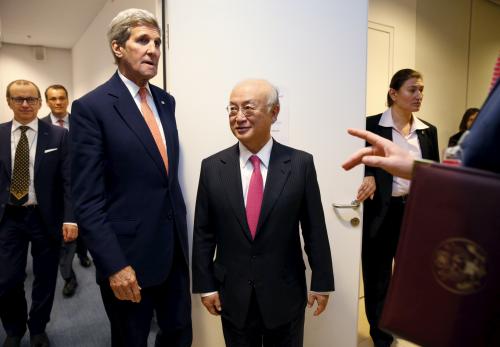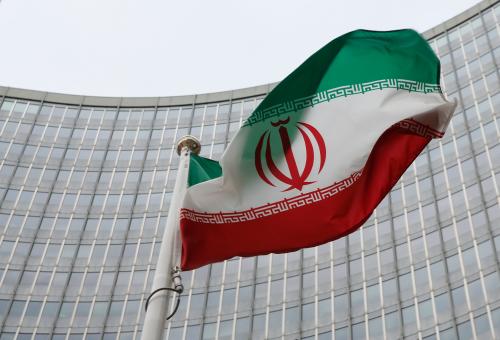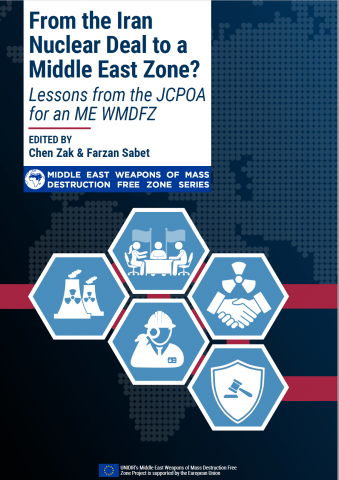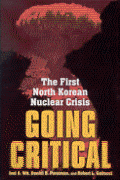One year after its conclusion, the Joint Comprehensive Plan of Action (JCPOA) remains controversial in Tehran and Washington, with opponents unreconciled to the deal and determined to derail it. Republican attacks against the deal will keep the controversy alive for most of this election year.
But opponents have had to scale back their criticism, in large part because the JCPOA, at least so far, has delivered on its principal goal—blocking Iran’s path to nuclear weapons for an extended period of time. No one can dispute that Tehran has sharply reduced its capacity to produce fissile materials for nuclear weapons and would need at least a year to rebuild enough capacity to produce a single bomb.
Iran’s positive compliance record has not given opponents much ammunition. The IAEA found Iran in compliance in its two quarterly reports issued in 2016. True, Iran temporarily exceeded the agreed ceiling on heavy water but quickly rectified the infraction, which most observers attributed to the practical difficulty of ensuring that production overages are exported in a timely way rather than to an intention to circumvent the limit. Critics have also pounced on a German report that Iran’s illicit attempts to procure nuclear and missile items continued in 2015. But Tehran’s requirement to import all nuclear items for its permitted civil nuclear program through the JCPOA’s procurement channel—and stop procuring items outside the channel—did not kick in until January 2016, and neither Washington nor Berlin has information that illicit efforts continued after that time.
Murky missile issue
Iran’s ballistic missile tests present a more complicated compliance issue. Due to a compromise reached in the negotiations, missile activities are not covered in the JCPOA and Security Council resolution 2231 simply ”calls upon” but does not legally require Iran to cease those activities (as did the U.N. Security Council resolutions replaced by 2231). As a result, Iranians argue they are not legally bound to cease missile testing, and Russia and China essentially support their argument.
The administration and Congress are right to oppose Iran’s provocative and destabilizing missile activities. But they are not on strong legal or political grounds to treat the issue as a compliance violation. Rather than invoking the Iran nuclear deal, Washington and its partners will need to counter Iran’s missile programs with other policy tools, including interdictions of procurement attempts, Missile Technology Control Regime restrictions, U.S. diplomatic efforts with suppliers, missile defenses, and sanctions.
An uncertain path ahead
So, from the standpoint of Iran implementing and complying with its nuclear commitments, the JCPOA has operated well for its first year. But challenges to the smooth operation and even the longevity of the deal are already apparent.
A real threat to the JCPOA is that Iran will blame the slow recovery of its economy on U.S. failure to conscientiously fulfill its sanctions relief commitments and, using that as a pretext, will curtail or even end its own implementation of the deal. Iranians are understandably frustrated that the benefits of sanctions relief have not materialized as quickly as expected. But international banks and businesses have been reluctant to engage Iran not because they have been discouraged by the United States but because they have their own business-related reasons to be cautious, including the inadequate regulatory standards of Iran’s financial system, low oil prices in an oil-dependent economy, and fear of running afoul of remaining U.S. sanctions. In an effort to ensure that Iran will reap the economic rewards it deserves, the Obama administration has bent over backwards to inform foreign governments, banks, and businesses of what sanctions relief measures entitle them to do, but Iranian officials continue to complain that it is not doing enough.
[W]e can say the nuclear deal is off to a promising start…[s]till, it is already clear that the path ahead will not always be smooth.
Legislation proposed in Congress could also threaten the nuclear deal. Many proponents of new sanctions legislation genuinely seek to reinforce the deal—for example, by renewing the Iran Sanctions Act without attaching poison pills. But for some other members of Congress, the bills are designed to undercut the JCPOA. In a July 11 statement of policy, the administration threatened to veto three House bills, stating that they “would undermine the ability of the United States to meet our JCPOA commitments by reimposing certain secondary economic and financial sanctions lifted on ‘Implementation Day’ of the JCPOA.” For now, the administration is in a position to block new legislation that it believes would scuttle the nuclear deal.
But developments outside the JCPOA, especially Iran’s regional behavior and its crackdown on dissent at home, could weaken support for the JCPOA within the United States and give proponents of deal-killing legislation a boost. So far, however, there are no clear indications that the JCPOA has contributed either to more moderate or more provocative behavior. Indeed, consistent with statements by Supreme Leader Ali Khamenei, there have been few changes in Iran’s behavior toward its neighbors in the last year.
A potential wildcard for the future of the JCPOA is upcoming governing transitions in both Washington and Tehran. There will be more continuity in policy toward Iran and the JCPOA if Hillary Clinton becomes president, although she is likely to take a harder line than her predecessor. Donald Trump now says he will re-negotiate rather than scrap the deal, but in practice that could produce the same result because a better deal will not prove negotiable. With President Hassan Rouhani up for re-election next year and the health of the Supreme Leader questionable, Iran’s future policy toward the JCPOA cannot be confidently predicted.
A final verdict on the JCPOA is many years away, not just because of the challenges mentioned above but also because of the crucial uncertainly regarding what Iran will do when key restrictions on its ability to produce weapons-grade nuclear materials expire after 15 years. However, we can say the nuclear deal is off to a promising start, as even some of its early critics now concede. Still, it is already clear that the path ahead will not always be smooth, the longevity of the deal cannot be taken for granted, and keeping it on track will require constant focus in Washington and other interested capitals.










Commentary
The Iran deal: Off to an encouraging start, but expect challenges
July 13, 2016